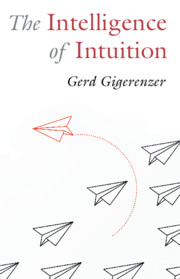Book contents
- The Intelligence of Intuition
- The Intelligence of Intuition
- Copyright page
- Dedication
- Contents
- Figures and Tables
- Preface
- Acknowledgments
- Chapter 1 We Know More Than We Can Tell
- Part I The War on Intuition
- Part II Intuition and Its Intelligence
- Chapter 5 Heuristics: The Tools of Intuition
- Chapter 6 Embodied Heuristics
- Chapter 7 Moral Intuition
- Chapter 8 Simple Heuristics to Run a Research Group
- References
- Index
Chapter 8 - Simple Heuristics to Run a Research Group
from Part II - Intuition and Its Intelligence
Published online by Cambridge University Press: 28 September 2023
- The Intelligence of Intuition
- The Intelligence of Intuition
- Copyright page
- Dedication
- Contents
- Figures and Tables
- Preface
- Acknowledgments
- Chapter 1 We Know More Than We Can Tell
- Part I The War on Intuition
- Part II Intuition and Its Intelligence
- Chapter 5 Heuristics: The Tools of Intuition
- Chapter 6 Embodied Heuristics
- Chapter 7 Moral Intuition
- Chapter 8 Simple Heuristics to Run a Research Group
- References
- Index
Summary
Collaboration between researchers has become increasingly common, enabling a level of discovery and innovation that is difficult to achieve by a single person. But how can one establish and maintain an environment that fosters successful collaboration within a research group? In this case study, I use my own experience when directing the ABC Research Group at the Max Planck Institute for Human Development in Berlin. I describe the heuristic principles for setting up a research group, including (i) common topic and multiple disciplines, (ii) open culture, (iii) spatial proximity, and (iv) temporal proximity. I then describe heuristics for maintaining the open culture, such as setting collective goals, including contrarians, distributing responsibility, making bets, the cake rule, and side-by-side writing. These heuristics form an adaptive toolbox that shapes the intellectual and social climate. They create a culture of friendly but rigorous discussion, embedded in a family-like climate of trust where everyone is willing to expose their ignorance and learn from the other members. Feeling accepted and trusted encourages taking the necessary risks to achieve progress in science.
Keywords
Information
- Type
- Chapter
- Information
- The Intelligence of Intuition , pp. 141 - 153Publisher: Cambridge University PressPrint publication year: 2023
